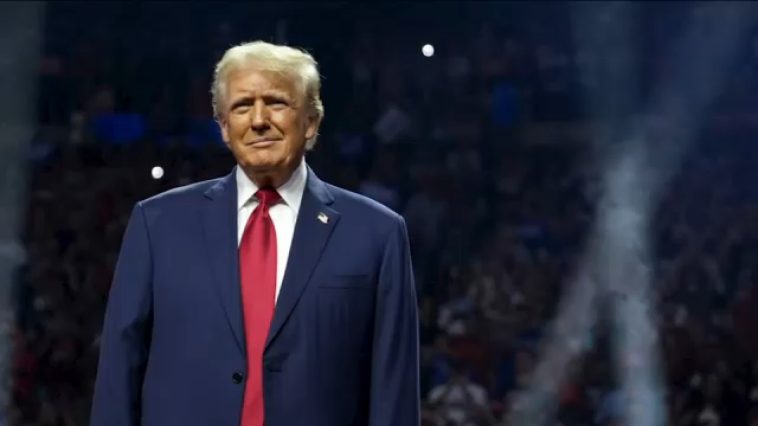In a turn of events that outpaced both critics and supporters alike, the 2025 re-emergence of Donald Trump to presidential power echoed an iconic cinematic tale. It’s much like the journey of ‘Star Wars’ that proceeded from ‘A New Hope’, trudging through ‘The Empire Strikes Back’, and ultimately leading to victorious culmination reminiscent of ‘Return of the Jedi’. Brushing aside the setback of losing the presidency in 2020, enduring contentious legal battles, and withstanding an intense media exposure, Trump’s political downfall appeared inevitable. Yet, like a classic underdog, he effectively weaponized disorder to his advantage.
The notorious Capitol incident on January 6, 2021 may have blemished Trump’s public image, but also solidified his faithful support base. Seen in retrospect, his break from office recast him as a political martyr — the man who combatted the ‘swamp’ and lived to share his experience. As 2024 rolled in, Trump resurfaced with newfound ferocity. His rallies were no longer mere political gatherings but, had morphed into cultural spectacles marinating MAGA ardor in a carnival-esque spirit.
Demonstrating his unique ability to adapt and evolve, Trump positioned himself as the ‘sole savior’ capable of restoring economic stability and clearing cultural ambiguities within a fractioned America. His political resurrection was not just unlikely but uncannily dramatic, akin to the grand narratives of cinema.
Historically, the Republican Party’s strength rested on the shoulders of evangelicals, suburban conservatives, and corporate elites. Trump boldly rewrote this narrative. His campaign of 2024 attracted wide-ranging support groups from Silicon Valley libertarians to disillusioned minorities, blue-collar Democrats, and a younger demographic that had grown critical of what they deemed ‘woke excesses’.
It was a respective coup for Trump when he garnered the support of Elon Musk, resulting in guest appearances on influential podcasts and backing his stance on free speech. This alliance injected a modicum of modernity into the MAGA brand. Simultaneously, Trump’s outreach to ethnic groups broke new ground; his corporate-friendly policies and non-interventionist approach to foreign policy resonated with Arab Americans in Michigan and Hispanic voters in Arizona and Florida.
Interestingly, even African Americans, traditionally suspicious of the GOP, began viewing Trump as a plain-speaking alternative to the perceived condescension of Democrats. In an extraordinary twist of events, the Amish community became one unexpected demographic in support of Trump. After authorities in Pennsylvania targeted an Amish farmer on grounds of raw milk sales, Trump seized the opportunity to position himself as a savior of religious liberties.
Arguably, Trump’s coalition was a marvel, but his team was nothing short of a conservative political powerhouse. Elon Musk emerged not only as a tech guru but as Trump’s bridge to the future. JD Vance, the eloquent senator from Ohio, served as the brains behind the operation, slicing through critics with incisive arguments.
Vivek Ramaswamy’s involvement helped dispel notions of ‘white supremacy’, presenting America as a nation founded on multiracial collaboration and meritocracy. Addition of Tulsi Gabbard and RFK Jr. made Trump’s campaigning team the most ideologically diverse in contemporary political history.
Every team member fulfilled a tactical purpose. Gabbard’s Democrat roots enabled her to chastise the left from an insider’s perspective, avoiding overtly partisan undertones. RFK Jr.’s anti-establishment stance appealed to skeptics of both mainstream parties. In parallel, Barron Trump astutely steered the podcast strategy, winning audiences over with candid, lengthy interviews that projected his father’s authenticity and approachability.
The election of 2024 was not just about administrative protocols but cultural identity. Trump’s vision of America was rooted in traditional gender roles and binaries. Contrarily, Democrats seemed entangled in a web of gender pronouns, microaggressions, and exaggerated moral posturing.
Kamala Harris, running as the Democratic nominee, found it hard to establish a bond with the median voter. Focusing heavily on identity politics, her campaign estranged center-leaning voters. On the other hand, Trump’s blunt, apologies-deficient approach struck a chord with those weary of political correctness. His campaign essentially drilled down to a simple message: ‘Trump is for you; Kamala is for they/them’.
This election wasn’t limited to rhetoric; it was essentially a combat for the nation’s soul. Trump’s victory invoked more than political triumph; it symbolized a cultural paradigm shift.
On taking up office on January 20, 2025, Trump proclaimed, ‘The days of American regression are over. Today, we herald a fresh start.’ His inauguration, featuring performances by popular artists Kid Rock and Lee Greenwood, wasn’t just a ceremonial event but a declarative stance. The famous mogul was back, ringing in the era of an America he pledged to revivify.


